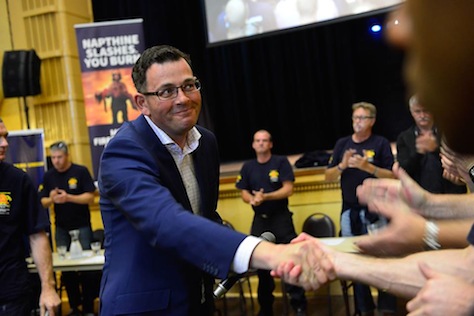It may yet be a long way back to taking national power in Australia, but the center-left Australian Labor Party will begin in Victoria, where it reclaims only its second state government across Australia.![]()
![]()
Victoria, the second-most populous state in Australia, and home to Melbourne, has long been friendly terrain for Labor.
It’s not surprising, then, that Labor would win Saturday’s election, even though it represents the first time in 60 years that the electorate in Victoria tossed out a government after just one term in office.
Though results are not yet final, reliable early accounts give Labor 47 seats in the 88-member Legislative Assembly, and the Liberal Party’s leader, outgoing premier Denis Napthine, has already conceded defeat.
The Victorian election is a moderate defeat for Liberal/Coalition prime minister Tony Abbott, who had hoped that Napthine, who has led a razor-thin majority coalition since 2013, could eke out a victory. Napthine replaced Ted Baillieu, who resigned in March 2013 in the wake of a minor scandal involving government favors and the anti-corruption commission. Geoff Shaw, a rogue backbencher, caused headaches for both Liberal premiers, and he was indirectly responsible for Baillieu’s resignation last year.
Labor will take power under Daniel Andrews (pictured above), the leader of the opposition since 2010. Abbott didn’t campaign hard for Napthine, but national Labour leader Bill Shorten, a Melbourne native, devoted significant time and resources to the campaign.
Among the hottest issues in the campaign was a proposed East-West Link, an 18-km tollroad that would have linked the far ends of the Melbourne metropolitan area. It was one of the crowning infrastructure projects of the Liberal/Coalition government in Victoria, though Labor was always far more hesitant about the project.
Ultimately, it’s hard to say that the Victoria result, close as it was, is a harbinger of much of anything for national politics. Abbott brought the Coalition back to power in September 2013 after six tumultuous years of Labor government under Kevin Rudd, Julia Gillard and, for a brief time, Rudd again last summer.
His chief policy accomplishment is the repeal of the two chief policy achievements of the previous Labor government — a carbon trading scheme and a mining tax, both of which Gillard and Labor enacted in 2012, after Rudd and the party campaigned on them in 2007.
Abbott doesn’t have to call another election until January 2017 and he currently enjoys a strong majority in the House of Commons, the lower house of the Australian parliament. Nevertheless, though Abbott last year won a relatively robust victory (53.5% of the two-party preferred vote for the Coalition versus just 46.5% for Labor), the government now narrowly trails Shorten’s Labor by a margin of 52% to 48%, according to the most recent November Essential survey. Much of the unpopularity stems from Australia’s slowing economy, due in large part to China’s respective economic slowdown, and unemployment in Victoria is currently running the highest in the country at 6.8%.
In short, though Victoria’s election was a solid win for Labor and something of a personal victory for Shorten, there’s not so much to read into the result for a federal election that might be held more than two years from now.

